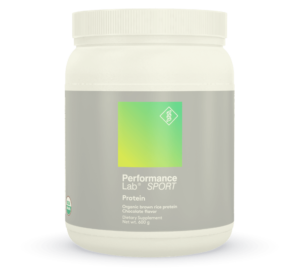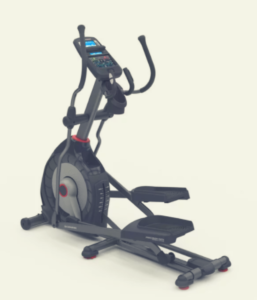If you are in a hurry and just want to find out what the best rice protein for runners is, then we recommend Performance Lab® SPORT Protein as the best one.
Protein powders are one of the easiest ways to help runners promote muscle growth while still decreasing overall body weight.
Rice proteins in particular avoids common allergies people might have to whey or soy. But how do we go about deciding on the best rice protein for our runs?
Here are the top rice protein we’ll be reviewing:
- Terrasoul Superfoods Organic Sprouted Brown Rice Protein Powder
- Naked Rice
- Judee’s Brown Rice Protein
- Nutribiotic Raw Organic Rice Protein
- Performance Lab® SPORT Protein

Why Is Protein Important for Runners?
To understand which protein to use we should first look into why it’s so important for runners. People often assume that protein is only tied to weightlifting.
However, that’s essentially what running is. Think about what happens every time you take a step while running.
Every move we make while running involves lifting up our entire bodyweight. We perform this action, known as running cadence, at a rapid pace.
The ideal running cadence is about 180 steps per minute. Imagine how much muscle it’d take to bench your bodyweight 180 times in just 60 seconds!
However, runners face a unique challenge when gaining muscle.
As runners we’re always trying to make it easier to lift our body weight. We can accomplish this feat in part by gaining muscle.
But at the same time muscle will itself increase our overall body weight. This means that we need to specifically aim to gain muscle while losing fat.
Thankfully we can do so by maximizing protein intake while also keeping our calorie count in line with our needs.
This is where supplemental protein comes into the picture.
A protein supplement is a low calorie option to increase our total protein intake without specifically limiting us to a set selection of high protein foods.
Why Go for Rice Protein Over the Other Choices?
Protein is essentially just a collection of chemical building blocks called amino acids. This is also where the term complete protein comes up.
A complete protein contains the full set of amino acids humans need to build muscle. Incomplete proteins might lack certain amino acids.
An incomplete protein needs to take in spare amino acids from other foods in order to build muscle. Obviously it’s a lot more healthy and efficient to simply take in a complete protein.
One of our biggest advantages in taking protein supplements comes from the assurance that we’re getting a complete protein.
But anyone who’s looked into supplements can attest that there’s a vast number of options out there.
Why are we specifically looking at rice protein?
It’s true that all proteins are broken down into amino acids within the body. But there’s a larger question of what other materials are coming in with the base protein.
These usually stem from where the protein was sourced. People with soy allergies or sensitivity are going to have issues with soy protein.
People with dairy allergies will typically have issues with whey protein.
Rice based proteins have far less potential allergens. What’s more, it’s also suitable for people avoiding animal products.
Finally, rice protein is eco-friendly. Rice is one of the easier crops to grow and harvest without much ecological impact.

How Can Runners Get the Most Out of Protein Supplements?
We’ve looked into why protein is so important. But how can we figure out just how much protein we need to maximize our performance?
The good news is that we don’t really have to worry about taking too much protein. Eating too many calories is a big deal.
But our bodies are fairly good at handling excess protein. For the most part our bodies will just naturally get rid of excess protein in a similar way to excess vitamins.
It’s usually a good idea to know how much protein we need before starting to supplement. We don’t want to essentially spend money on something our body immediately discards.
To ensure that’s not the case we begin by estimating our average protein intake.
We simply need to go over what we eat over an average day. We should begin by taking note of what, and how much, we’ve eaten over the course of our day.
Next, we look up the protein content of our meals. We then subtract that total from an ideal protein intake for runners.
Generally a runner will want to take in about 1 gram of protein for every pound they weigh.
We’ll use a 150 lb runner as an example. He’d ideally want to ingest 150 grams of protein per day. Going over his average day he discovers that he’s eating 60 grams of protein per day. He’d want to supplement his diet with about 90 grams of protein.
Of course it’s also important to use the best rice protein. Now that we’ve looked into why protein is important for runners we can go over some choices.
There’s a wide variety of options out there. But we’ll narrow things down to the top five choices for the best rice protein supplement for runners.
Best Rice Proteins Reviewed
Terrasoul Superfoods Organic Sprouted Brown Rice Protein Powder
Terrasoul Superfoods Organic Sprouted Brown Rice Protein Powder delivers 6 grams of protein per tbsp. It’s also one of the lower calorie options for rice protein.
That single serving of powder is only about 40 calories. This makes it ideal for cutting down calories.
Pros
- At only 40 calories this is one of the lower calorie protein powders.
- Terrasoul has a great reputation for high quality products.
- Processing is kept to a minimum
Cons
- The low calorie count comes from lack of flavoring agents. This is a bonus for people who want to keep calories as low as possible. But others might want to mix it with a flavored beverage or a little sugar.
- The powder is a lot finer than competitors. This can lead to clouds of powder making a mess if you’re not careful.
- The included scoop isn’t accurate to the recommended serving size. It’s a minor issue, but make sure you’re using your own tablespoon to measure it.
Naked Rice
Naked Rice puts a heavy emphasis on the fact that it’s 100% organic brown rice protein. Each 3.9 tbsp serving delivers 25 grams or protein.
Naked Rice also provides some extra vitamins and minerals in addition to the protein. The powder’s caloric total is a respectable 120 calories per serving.
Pros
- Naked rice packs a lot of protein into a single serving. 25 grams of protein should deliver a sizable percentage of most runner’s daily intake.
- Calcium is an important part of any runner’s diet. It can help our bones stay strong even when we’re providing a lot of force to them on a daily basis. Naked Rice’s 72mg provides a full 7% of the RDA for calcium. If the powder is mixed with a glass of milk that’d come out to 37% of the day’s calcium from a single serving.
- Female runners in particular are often deficient in iron. Naked Rice provides 22% of the RDA for iron.
Cons
- The powder is fairly thick. This means that you’ll often need to put in some extra work to fully mix it in with beverages.
- It has a fairly strong flavor compared to most rice proteins. Many people feel that this distinct taste is unpleasant.
- The thick consistency can cause stomach or gastrointestinal discomfort for some people.
Judee’s Brown Rice Protein
Judee’s Brown Rice packs 21 grams of protein into a 4 tbsp serving size.
It also contains 100 calories per serving. Judee’s protein is especially notable for the care and attention given to people with food sensitivities.
For example, it’s prepared in a gluten and nut free bakery to reduce chances of negative reactions.
Pros
- Judee’s provides special recipes to use with the powder. This means that you don’t just have to drink it. You can even use it to cook delicious desserts like cheesecake.
- The protein blends well into smoothies.
- Friendly for vegetarians, vegans and people with nut or gluten allergies.
Cons
- It’s non-GMO. However, this rice protein isn’t certified as organic.
- It’s difficult enough on the GI system that Judee’s recommends people slowly build up how much they take per day.
- While it’s good for baking it’s less well suited to mixing unless you’re using a blender.
Nutribiotic Raw Organic Rice Protein
Nutribiotic Raw Organic Rice Protein is a more flavorful alternative to the previous options. The protein has a distinct vanilla taste.
A 1 tbsp serving provides 12 grams of protein in only 60 calories.
Pros
- The vanilla flavor can help people who dislike the taste of unflavored rice protein.
- The powder is run through an allergen cleanser. Additionally Nutribiotic randomly tests the powder to ensure gluten levels are below their 5 ppm threshold.
- The powder is processed with special enzymes. This might help people with sensitive stomachs handle the product without gastrointestinal distress.
- An unflavored version is also available for people who don’t like vanilla.
Cons
- The powder can be somewhat grainy. As such it’s best to mix it with a more viscous liquid like milk rather than water.
- The vanilla flavor might be a little too weak for some palates. If that’s the case you might need to use vanilla flavored milk or vanilla extract for taste.
Performance Lab® SPORT Protein
Each 30 gram serving of Performance Lab® SPORT Protein delivers 20 grams of protein. Despite the fact that it has a pleasant flavor the calorie count only comes out to 100 calories per serving.
This and many of the other benefits are due to Performance Lab’s patented formula.
Pros
- Uses a special patented formula to increase absorption.
- Flavored and sweetened with vanilla bean, monk fruit, stevia, organic cocoa and yacon root.
- Manufactured with a lower heat level to help retain nutrients.
- Enhanced with probiotics to improve protein absorption.
- The only rice protein on the market specifically made to enhance athletic performance.
- The proprietary formula also helps to curb hunger.
Cons
- Some people might not want the extra frills provided by Performance Lab’s special processes.
- The great taste comes with slightly more calories than unflavored protein.
Which Protein Wins First Place?
All of the options we’ve looked at have a lot going for them. Which comes out on top as the best rice protein?
In the end Performance Lab® SPORT Protein comes out on top for most of the features we’ve examined.
Taste and texture are two recurring problems with the rice protein options we’ve examined. Or at least it’s a recurring problem with the exception of Performance Lab® SPORT Protein.
Their patented formula provides a protein which mixes easily and tastes great. Their probiotic enhancements also ensure that it’s more easily digested than the competition.
Runners need to use supplemental protein as a part of their daily routine. We noted earlier on that most people don’t get enough protein in their normal diet.
Supplementing every day just isn’t feasible if we experience stomach upset or hate the taste of our protein. That’s why in the end Performance Lab® SPORT Protein wins as the best rice protein.
It’s a protein supplement which we can actually look forward to drinking. In the end we need to look at protein as equipment for our runs.
It’s as important to ensure we can drink protein every day as it is to wear comfortable shoes on every run.









